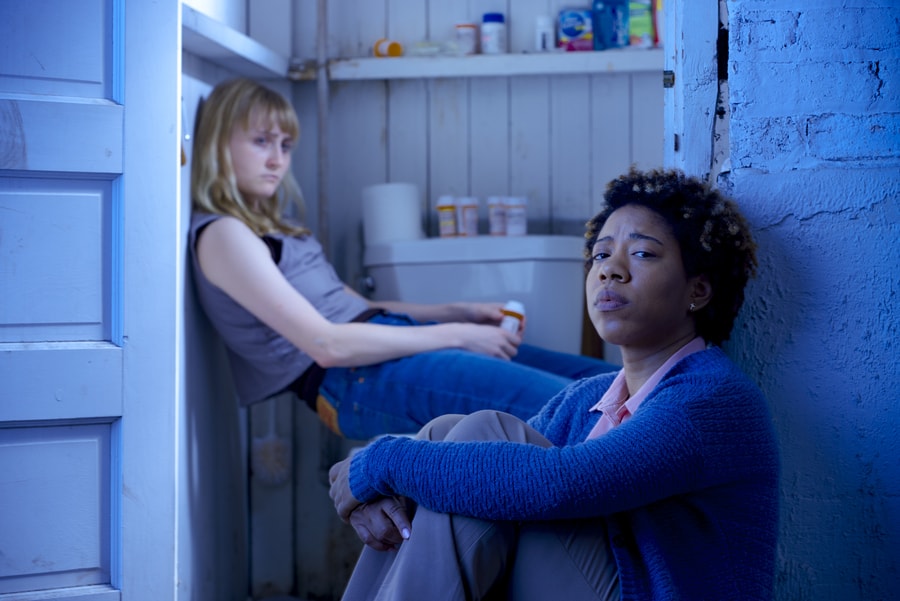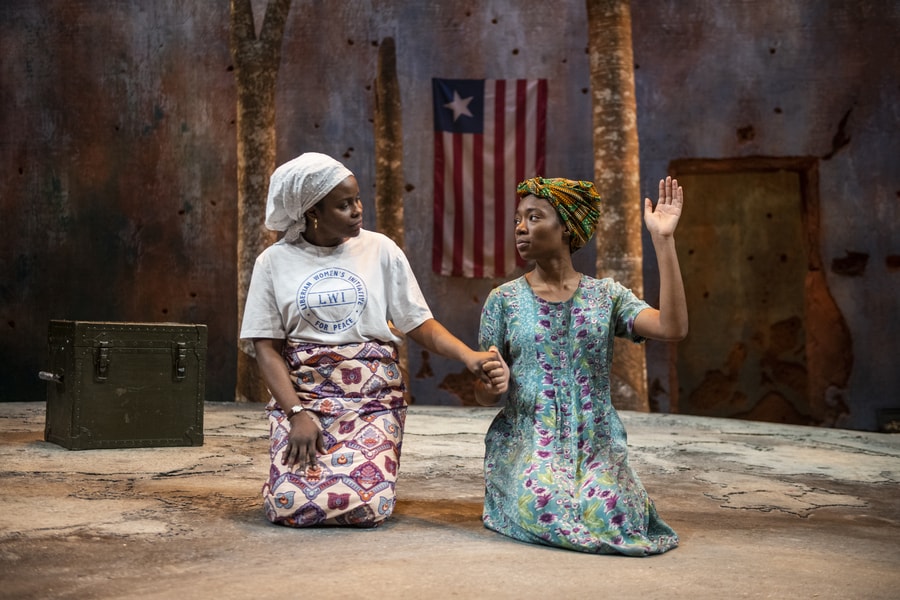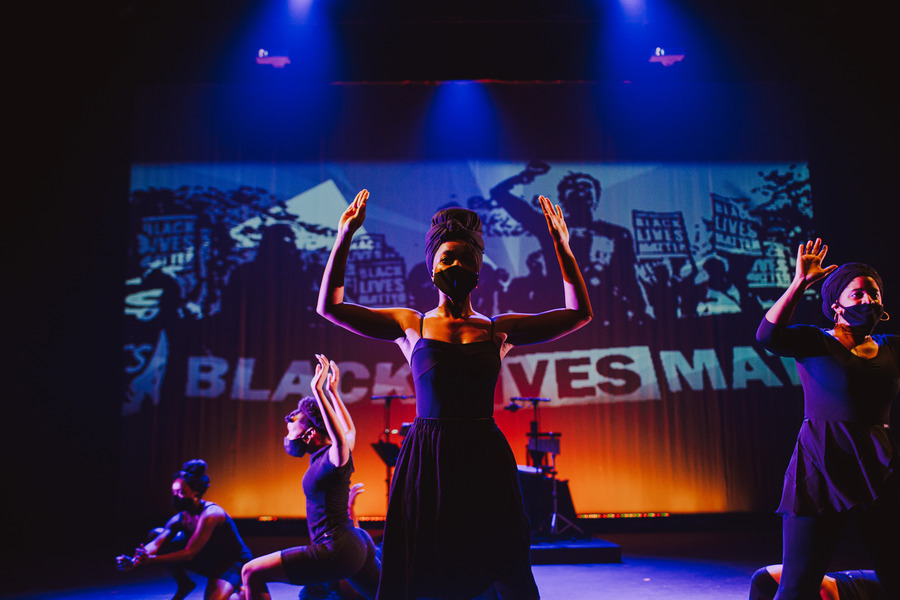Theatres in the Great Lakes region have taken COVID-19 more or less in stride. Adjusting to production cancellations and tight budgets is just a matter of business, these organizations say, as they turn their real attention to urgent matters of restructuring, educating, and advocating for social justice in Illinois, Wisconsin, Ohio, and Indiana.

“I just want to share with you that you are valuable and necessary in this fight for Black people to be seen, felt, heard, understood, and treated as human beings.” This was in an email from actor and director Rashada Dawan that arrived in Tara Mallen’s inbox shortly after the Black Lives Matter movement gained significant footing at the beginning of June. Mallen, the artistic director of Rivendell Theatre Ensemble, a new-works women’s company in Chicago, knew she had to act.
Rivendell released a statement in solidarity with the BLM movement and began a strategic planning process to increase diversity and equity within the company. Dawan challenged Mallen, and many other Chicago theatres, to reexamine every aspect of the company’s operation, from content produced to diversity in leadership to vendors to banks they did business with.
“The gift of COVID-19 is a real opportunity to be still and quiet for a minute and look inward,” Mallen said, adding that the company has been trying to produce at least one play written by a woman of color each year for the last two years. “We have some serious work to do on that front.”
Rivendell hopes to bring a person of color into an artistic leadership role by the end of the calendar year. “We are just trying to be transparent about what we haven’t done yet,” Mallen said. “And get excited and hopeful about how we can change Rivendell moving forward.”
Before the pandemic hit, Rivendell was preparing for the world premiere production of Spay, a play by Madison Fiedler set amid the opioid crisis in the Appalachian region of West Virginia. The production has been postponed until the theatre can be reopened, hopefully in early 2021, with the artists who were previously committed to the production still committed.
Rivendell had also launched its first solo voices festival featuring four solo plays, three of which were written by women of color. It was supposed to take place in person but was able to be adapted to digital readings released at the end of April. After the success of the digital readings, Mallen hopes to stage small readings of these with fewer than 10 audience members in the fall to give the playwrights an opportunity to develop their work with the benefit of live feedback.
Financially, Rivendell is managing for now, but is hoping for a quick return to in-person operations. “We have the ability to shutter in a way that the larger institutions can’t,” Mallen said, “and we have a flexibility and opportunity to be elastic. So we are fine right now. I’m more concerned looking forward.”
Normally, when the ensemble isn’t using their facility, it is rented out to other organizations. Since March, Rivendell has lost 10 weeks of projected rental income since no one has been able to use the facility. Thankfully, relief funds from the Paycheck Protection Program and Illinois Humanities have allowed the ensemble to pay staff salaries through July. Rivendell was in a strong financial position before the pandemic, though it had to cancel its spring gala, a vital fundraiser for the organization.
Mallen is determined not to let the financial setbacks interfere with the organizational changes inspired by Dawan. “It’s all too easy to sit comfortably within our white privilege,” Mallen said. “We are committed to no longer allowing that complicity to be the modus operandi at Rivendell. We can and will do better.”

Even as one of the largest professional theatres in the country, Milwaukee Repertory Theatre hasn’t escaped the COVID-19 pandemic or the financial stress that accompanies it. The Wisconsin theatre has cancelled 120 performances since mid-March, losing $1.5 million in revenue.
“It’s not a mystery that this is a hardship,” said artistic director Mark Clements. “This crisis is going to take the best of all of us. But this theatre has been a cultural cornerstone in Milwaukee for over 65 years, and we will do everything we can do to make sure that continues.”
The company was able to maintain its full-time staff from the shutdowns through the end of July, but after that the theatre will implement an 8 percent reduction in staff and reduce salaries up to 10 percent (with the largest decreases for those with the highest salaries and no reduction for the lowest paid employees), said Clements. Milwaukee Rep also decreased the 2020-21 season budget by $2 million, requiring the company to “do more with less.”
The shutdown came on the heels of the final performance of John Cameron Mitchell’s Hedwig and the Angry Inch and interrupted the production of Eclipsed by Danai Gurira. The final run of that production was recorded in partnership with HMS Media, AEA, the SDC, United Scenic Artists, the International Alliance of Theatrical Stage Employees, Dramatists Play Service, and Vimeo, and was available online through April 1.
The company quickly adjusted to online programming, launching a series called From Our Home to Your Home. The online offerings include music, playwright essays, online workshops, educational programs, weekly wellness videos, and a “Reprise” showcase of the company’s favorite artists.
“I also host a series every week called ‘What’s the Tea?’ where I interview people from all walks of life who can offer a different perspective on dealing with the pandemic, working together to dismantle systemic racism in our country, and supporting awareness of the Black Lives Matter movement,” said Clements.
Milwaukee Rep’s virtual programming will continue through September thanks to the more than $100,000 the company raised specifically for the creation of online content. This will tide it over until the start of the 2020-2021 season, which has been delayed from Labor Day to the end of October.
Meanwhile, the company is working with the Kaleidoscope Group, a diversity and inclusion consultancy firm, to create an equity, diversity, and inclusion plan for the theatre, which has pledged to provide public updates on theatre operations monthly.
Despite the financial strain, cancelled performances, and operational shifts, Milwaukee Rep continues to press forward. Clements referred to the resiliency of the artists and the art form—quoting John Steinbeck, he said, “‘The theatre is the only institution in the world which has been dying for 4,000 years and has never succumbed.’”
And while the situation is brutal and the end is still a long way off, Clements does “truly believe that we will not succumb either.”

The oldest Black producing theatre in the country will not let the COVID-19 pandemic, shutdowns, or social distancing keep it from creating art and inspiring activism. Karamu House in Cleveland has continued to produce theatre that educates the audience about systemic racism and social justice, including its recorded debut of Freedom on Juneteenth, which was available for free online on June 19, June 29, and July 5.
“For so many years artists have been on the front line of social change,” said the company’s president and CEO, Tony Sias. “Karamu House feels as if we have a responsibility to take a lead in communicating our response to it and activating our community to talk about how we participate in social justice, police reform, and eradicating systemic racism in this country.”
The Juneteenth production used music, dance, and spoken word performed in the theatre with socially distant staging and a panel discussion with community leaders about the development of the Black Lives Matter movement.
“It was a tough decision bringing people together,” Sias said. “But to each performer, with their commitment to Black Lives Matter, it was important to come in and do the work. Artists wanted to be able to channel their anger, their frustration, their passion for change in a healthy positive way. So it was a cathartic experience for all of us.”
Prior to the shutdown, Karamu House had closed their production of Aja Hannah’s Sassy Mamas and was one week from opening Katori Hall’s Hoodoo Love, which was cancelled along with Brian Yorkey and Tom Kitt’s Next to Normal. The education program was moved to an online platform and now boasts students from eight states, expanding Karamu’s mission beyond Cleveland.
The company is still sorting the full schedule for next season but plans to mount Greenwood: An American Dream Destroyed, a play about the destruction of Black Wall Street in Tulsa, Okla., by Celeste Bedford Walker sometime between January and June of 2021. The production will commemorate the 100th anniversary of the massacre.
“We wanted to celebrate and educate the community about the shooting, but also take our viewers on a historical journey of the African American experience—the challenges that we’ve been confronted with and how we’ve overcome them throughout our historical trajectory in this country,” Sias said.
Karamu House is in need of ongoing support, Sias said. As of July 1, the senior management has taken a 10 percent pay cut to maintain the full staff. Like many, Karamu’s leaders hope for the swift arrival of a vaccine or medical therapy to combat the pandemic and return people to the theatre.
Sias challenges the theatre industry to make changes to address systemic racism, increasing diversity in leadership, employing more Black designers, and supporting African American students pursuing education.
“The Black Lives Matter movement is important to civil rights in the country,” Sias said. “From Karamu’s mouth to your ears, Black Lives Matter.”

The pandemic means that Actors From the London Stage (AFTLS) will not come to South Bend, Ind., this summer, and the Notre Dame Shakespeare Festival (NDSF) will not mount live productions for its 20th anniversary season. Still, Shakespeare at Notre Dame will not be dissuaded from sharing the Bard’s great works with others.
ATFLS is a touring company founded by Professor Homer “Murph” Swander from the University of California, Santa Barbara, and renowned actor Sir Patrick Stewart that moved its U.S. home to the University of Notre Dame in 2000. ATFLS and the NDSF, a summer festival comprising professionals and Notre Dame students, make up Shakespeare at Notre Dame. When the pandemic broke wide in the U.S. in March, ATFLS members returned to London and the NDSF reformatted its festival for online.
Rather than a summer of live theatre, Shakespeare at Notre Dame is offering a series of workshops “to keep ourselves active, to keep our audiences engaged, and to test different strategies of content delivery,” said Scott Jackson, the Mary Irene Ryan Family executive director of Shakespeare at Notre Dame. With the help of the university’s endowment, Shakespeare at Notre Dame hopes to have live performances as soon as possible, but that is not likely before the spring of 2021.
In the meantime, the organization is revamping its Shakespeare in Prisons Conference 2020. Rather than meet in person for three days at the end of October, the conference will be expanded to a month of virtual panels, keynote speakers, and workshops. Jackson is working to reimagine the leadership structure for the Shakespeare in Prisons Network.
“We believe that that’s the best way we can stand in solidarity with our BIPOC colleagues, friends, and family—to create systems that promote action,” said Jackson.
Shakespeare at Notre Dame also works with the juvenile justice system through DePaul Academy. Grant Mudge heads up a twice-weekly drama class that the students nicknamed the Shakespeare Squad. The group has recently recorded scenes from MacBeth for their final production of the 12-week semester. Mudge said the students at DePaul are often hesitant to participate at the beginning of each class, but at “magic minute 11,” they dive right into the story.
“Not everybody will always love standing onstage speaking Shakespeare,” conceded Mudge. “But there are all sorts of terrific light-bulb moments and recognitions of, Oh, here’s something I never thought I could do, but I can.”
Shakespeare at Notre Dame’s work at justice centers is just one contribution toward changing the narrative of the theatre industry and the social systems in the United States.
“There are a lot of invisible structures that are being made harshly visible,” said Jackson. “I’m hoping that our community is able to approach those with grace and humility and seeks to dismantle supremacist systems that have been in place for time immemorial.”
Kate Mazade is a Goldring Arts Journalism graduate student at Syracuse University.
Creative credits for production photos: Eclipsed by Danai Gurira, directed by May Adrales, with set design by Collette Pollard, costume design by Kara Harmon, lighting design by Annie Wiegand, sound design by Fan Zhang; Freedom on Juneteenth, by Tony Sias, Latecia D. Wilson, and Mary E. Weems, with music direction by Dave M. Thomas;


